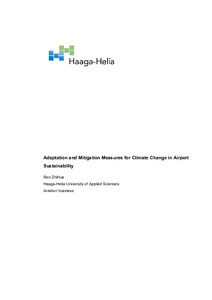Adaptation and Mitigation Measures for Climate Change in Airport Sustainability
Ren, ZhiHua (2024)
Ren, ZhiHua
2024
All rights reserved. This publication is copyrighted. You may download, display and print it for Your own personal use. Commercial use is prohibited.
Julkaisun pysyvä osoite on
https://urn.fi/URN:NBN:fi:amk-202404126382
https://urn.fi/URN:NBN:fi:amk-202404126382
Tiivistelmä
This thesis considers the crossroads of climate change and sustainability in aviation, focusing on implementing comprehensive strategies of adaptation and mitigation to address the escalating environmental concerns within the aviation sector. With the deteriorating impacts of climate change on airport infrastructure and operations, the necessity for immediate and proactive sustainability measures is apparent. This work employs a mixed-methods research approach, integrating in-depth literature analysis with empirical case studies to explore a broad spectrum of techniques for enhancing airport resilience and sustainability.
The thesis identifies critical mitigation strategies, such as the adoption of solar energy solutions and the integration of green building standards in terminal design, alongside the shift toward electrically powered ground support equipment. It also details various adaptation options, including strengthening coastal defenses against rising sea levels and improving drainage systems to handle increased rainfall. These initiatives are vital not only for diminishing the environmental footprints of airports but also for augmenting their resilience to climate perturbations.
Moreover, the thesis underscores the significance of policy and regulatory frameworks in bolstering airport sustainability efforts. It advocates for the establishment of consistent policies that foster green innovation, incentivize investment in sustainable technologies, and facilitate multistakeholder collaboration. Emphasizing the importance of engaging local communities and stakeholders in sustainability discussions, the thesis argues for inclusive and effective strategy formulation and execution.
In conclusion, the research demonstrates that, despite the significant challenges posed by climate change to airport sustainability, thoughtful and cohesive adaptation and mitigation measures can enable airports to counter these threats. The findings offer vital insights for airport executives, policymakers, and the broader aviation industry, charting a course toward a more sustainable and resilient aviation future.
The thesis identifies critical mitigation strategies, such as the adoption of solar energy solutions and the integration of green building standards in terminal design, alongside the shift toward electrically powered ground support equipment. It also details various adaptation options, including strengthening coastal defenses against rising sea levels and improving drainage systems to handle increased rainfall. These initiatives are vital not only for diminishing the environmental footprints of airports but also for augmenting their resilience to climate perturbations.
Moreover, the thesis underscores the significance of policy and regulatory frameworks in bolstering airport sustainability efforts. It advocates for the establishment of consistent policies that foster green innovation, incentivize investment in sustainable technologies, and facilitate multistakeholder collaboration. Emphasizing the importance of engaging local communities and stakeholders in sustainability discussions, the thesis argues for inclusive and effective strategy formulation and execution.
In conclusion, the research demonstrates that, despite the significant challenges posed by climate change to airport sustainability, thoughtful and cohesive adaptation and mitigation measures can enable airports to counter these threats. The findings offer vital insights for airport executives, policymakers, and the broader aviation industry, charting a course toward a more sustainable and resilient aviation future.
